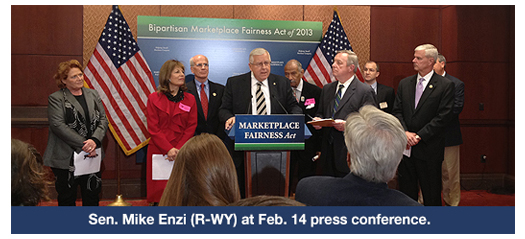|
February 25, 2013
Message from the President
 As the story below reports, legislation was introduced in both the U.S. Senate and House of Representatives that would establish a roadmap for states to collect the sales and use taxes on internet sales they are owed, which would provide tax parity for brick-and-mortar and internet retailers – leveling the playing field on which these sellers compete. As the story below reports, legislation was introduced in both the U.S. Senate and House of Representatives that would establish a roadmap for states to collect the sales and use taxes on internet sales they are owed, which would provide tax parity for brick-and-mortar and internet retailers – leveling the playing field on which these sellers compete.
NAREIT’s efforts to achieve fairness in sales tax collection extend back more than a decade. The movement for marketplace fairness, however, has gained momentum in recent years. Several states, notably California and New York, have enacted their own legislation requiring remote sellers to collect sales taxes on goods sold to customers within their borders. The National Governors Association and a number of prominent governors have endorsed the effort, as has online retailer Amazon.com.
The public support of a number of conservative governors and one of the largest online retailers has helped to rebut two of the most frequent, but inaccurate, claims used against tax parity: that it would create a new tax, and that compliance would be too difficult for online retailers.
In the 112th Congress, sales tax fairness legislation was introduced in both houses with bipartisan support, and both houses also conducted committee hearings on the issue. More support is lining up behind the legislation in the current Congress, illustrating the fact that, in Washington, progress on legislative solutions seldom happens quickly – but it does happen. NAREIT, working with the Marketplace Fairness Coalition and with the support of its members, will continue to advocate for a solution that will remove the unfair advantage remote sellers have over the brick-and-mortar based retail industry.

Steven A. Wechsler
President and CEO
Bill Proposed to Require Online Retailers to Collect Sales Taxes

Legislators from both sides of the aisle in Washington introduced a bill in the House of Representatives and Senate on Feb. 14 aimed at requiring online retailers to collect sales taxes on purchases.
Sens. Mike Enzi (R-WY), Dick Durbin (D-IL), Lamar Alexander (R-TN), Heidi Heitkamp (D-SD), Reps. Steve Womack (R-AR), Kristi Noem (R-SD), Jackie Speier (D-CA), Peter Welch (D-VT) and John Conyers (D-MI) introduced identical bills in both chambers. Similar measures were proposed in both houses of Congress in 2011 as part of the last two-year legislative cycle, which ended in January.
Supporters of the legislation, known as the Marketplace Fairness Act of 2013, H.R. 684, say it would help level the playing field between online retailers and their brick-and-mortar counterparts. Advocates of the bill also note that it would simplify state tax filing for individuals and help address state budget shortfalls at no cost to the federal government. States lost an estimated $23.3 billion in uncollected sales taxes in 2012, according to the National Conference of State Legislatures.
“The Marketplace Fairness Act would create a more level playing field on which all retailers may compete,” said NAREIT President and CEO Steven A. Wechsler. “It also would provide a critical source of revenues needed by our state governments today.”
The Marketplace Fairness Act also provides an exemption for small businesses and would relieve consumers from the burden of self-reporting sales and use taxes that are already owed.
The bill has garnered widespread support among industry organizations, including NAREIT. A host of online retailers, including industry bellwether Amazon.com, are also backing the proposal.
“The Marketplace Fairness Act will give all sellers the chance to compete in a free market without government preferences, relieve consumers of having to self-report sales/use taxes they already owe, exempt truly small businesses, and give states a roadmap for simplification that will provide them with flexibility to respond to today’s evolving marketplace,” said the Marketplace Fairness Coalition, a conglomeration of industry groups that support the bill, in a written statement. The National League of Cities, which represents 19,000 cities, towns and villages, also expressed support for the bill.
(Contact: Dara Bernstein at rdibblee@nareit.com)
REIT.com Video: Douglas Donatelli, First Potomac
 Doug Donatelli, founder, chairman and CEO of First Potomac Realty Trust (NYSE: FPO), joined REIT.com for a CEO Spotlight video interview. Donatelli discussed First Potomac’s decision to refocus its portfolio in the office sector while moving away from the industrial sector. Doug Donatelli, founder, chairman and CEO of First Potomac Realty Trust (NYSE: FPO), joined REIT.com for a CEO Spotlight video interview. Donatelli discussed First Potomac’s decision to refocus its portfolio in the office sector while moving away from the industrial sector.
“When we started out as a public REIT, we were really focused more on industrial properties with some office in the mix,” Donatelli said. “Our geographic focus is on the greater Washington metropolitan area, and Washington is much more of an office town than it is an industrial town. We felt we had a much better opportunity to grow our company by focusing on office, so we’ve recently decided to sell our industrial portfolio.”
Donatelli said the company has addressed a number of the challenges associated with shifting its portfolio focus over the last few years.
“We’ve grown our office portfolio substantially over the last three years or so. That has become the largest component of our overall portfolio, certainly from a revenue standpoint and from a square-footage standpoint also,” he said. “The industrial portfolio that we have has become a smaller and smaller component of what we’ve owned. Really, it somewhat muddled our message.”
(Contact: Matt Bechard at mbechard@nareit.com)
NAREIT Supports Bill to Exempt Derivatives End-Users from Unnecessary Margin Requirements
 NAREIT has joined a wide-ranging group of industry organizations in expressing support for a bill to ensure that regulators do not impose margin requirements on many derivatives end-users. NAREIT has joined a wide-ranging group of industry organizations in expressing support for a bill to ensure that regulators do not impose margin requirements on many derivatives end-users.
In a letter to Reps. Michael Grimm (R-NY), Austin Scott (R-GA), Gary Peters (D-MI) and Mike McIntyre (D-NC), the Coalition for Derivatives End-Users said their bill, H.R. 634, would provide “predictability and assurance” regarding the regulation of financial derivatives.
“We need Congress to step in and clarify that end-users will continue to have the ability to manage risk without the threat of having unnecessary initial and variation margin requirements imposed on them,” the Coalition wrote.
(Contact: Kirk Freeman kfreeman@nareit.com)
NAREIT’s Despins Presents at Benefits Summit
 Meredith Despins, NAREIT’s vice president of investment affairs and investor education, delivered a presentation to delegates attending the 10th Annual “Made in America” Taft-Hartley Benefits Summit, sponsored by conference organizer Financial Research Associates, LLC. The summit program was designed to educate pension fund trustees and professional staff on a variety of pension investment issues as well as health and welfare topics facing multi-employer and public sector pension funds in today’s challenging environment. Meredith Despins, NAREIT’s vice president of investment affairs and investor education, delivered a presentation to delegates attending the 10th Annual “Made in America” Taft-Hartley Benefits Summit, sponsored by conference organizer Financial Research Associates, LLC. The summit program was designed to educate pension fund trustees and professional staff on a variety of pension investment issues as well as health and welfare topics facing multi-employer and public sector pension funds in today’s challenging environment.
Despins delivered a presentation entitled “How Should Pension Plans Approach Real Estate in Today’s Market?” Highlighting findings from internal NAREIT and sponsored research, Despins set the stage by providing an overview of the current macroeconomic outlook and its implications for commercial real estate investment. She then spoke of how pension funds access the real estate asset class emphasizing the important role REITs play in managing risk within the real estate portfolio; how investors can optimally allocate investment capital across the real estate investment class in order to best meet portfolio goals; and on dimensions of diversification.
The summit, held in Las Vegas, was attended by more than 200 trustees and investment professionals from Taft Hartley and public pension funds, as well as by a number of leading global investment consulting and asset management organizations.
(Contact: Meredith Despins at mdespins@nareit.com)
Register Today for the 2013 Leader in the Light Working Forum
 The 2013 Leader in the Light Working Forum will be held March 18-19 at the La Quinta Resort & Club in La Quinta, CA, just prior to NAREIT's REITWise 2013 Law, Accounting & Finance Conference, which will take place at the same venue on March 20-22. The 2013 Leader in the Light Working Forum will be held March 18-19 at the La Quinta Resort & Club in La Quinta, CA, just prior to NAREIT's REITWise 2013 Law, Accounting & Finance Conference, which will take place at the same venue on March 20-22.
The 2013 Leader in the Light Working Forum provides NAREIT corporate members the opportunity to gain an in-depth understanding of the 2013 Global Real Estate Sustainability Benchmark (GRESB) Survey, including the supplemental Leader in the Light questions that this year will be embedded directly within the GRESB Survey. Importantly, the 2013 Leader in the Light Working Forum will take place in advance of the timeframe during which GRESB/Leader in the Light submissions will be accepted (April 1, 2013 to June 30, 2013).
Designed as an interactive, hands-on, collaborative workshop, working forum gives attendees the opportunity to further advance the sustainability conversation, and to better understand leading sustainability practices among peers.
For more details about the Leader in the light Working Forum or to view 2012's Leader in the Light Award winners, visit www.reit.com.
(Contact: Sheldon Groner at sgroner@nareit.com)
REIT.com Video: Jim Fetgatter, AFIRE
 Markets in the United States dominate as the top global cities for real estate investment, according to participants in the Association of Foreign Investors in Real Estate’s (AFIRE) annual survey. Markets in the United States dominate as the top global cities for real estate investment, according to participants in the Association of Foreign Investors in Real Estate’s (AFIRE) annual survey.
Jim Fetgatter, chief executive of AFIRE, spoke to REIT.com about the U.S. being the preferred investment market and other findings from the recently released survey. The top global cities for investment were New York, London, San Francisco, Washington and Houston.
“I think [non-U.S. investors] have some faith that the U.S. is coming out of the recession. The recovery may be slow, but I think they feel like it’s a definite recovery and we're not falling back down into another recession,” Fetgatter said.
Additionally, he said investors don't have a lot of other good alternatives for stable, secure investments.
In terms of other global trends noted in this year's survey, Fetgatter said there was renewed interest in Turkey and less interest in China. Turkey made the list this year as one of the countries providing the most stable and secure real estate investments, joining the U.S., Canada, Germany and Australia. The country was also ranked third among the top emerging countries for investment dollars.
“It appears that there is some shifting of [investors’] interest, maybe not totally away from China, but certainly they don’t have high expectations of China,” he said. “There’s an increased interest in Turkey that’s come back again after it’s been dormant for a while.”
(Contact: Matt Bechard at mbechard@nareit.com)

|

 As the story below reports, legislation was introduced in both the U.S. Senate and House of Representatives that would establish a roadmap for states to collect the sales and use taxes on internet sales they are owed, which would provide tax parity for brick-and-mortar and internet retailers – leveling the playing field on which these sellers compete.
As the story below reports, legislation was introduced in both the U.S. Senate and House of Representatives that would establish a roadmap for states to collect the sales and use taxes on internet sales they are owed, which would provide tax parity for brick-and-mortar and internet retailers – leveling the playing field on which these sellers compete.


 NAREIT has joined a wide-ranging group of industry organizations in expressing support for a bill to ensure that regulators do not impose margin requirements on many derivatives end-users.
NAREIT has joined a wide-ranging group of industry organizations in expressing support for a bill to ensure that regulators do not impose margin requirements on many derivatives end-users. Meredith Despins, NAREIT’s vice president of investment affairs and investor education, delivered a presentation to delegates attending the 10th Annual “Made in America” Taft-Hartley Benefits Summit, sponsored by conference organizer Financial Research Associates, LLC. The summit program was designed to educate pension fund trustees and professional staff on a variety of pension investment issues as well as health and welfare topics facing multi-employer and public sector pension funds in today’s challenging environment.
Meredith Despins, NAREIT’s vice president of investment affairs and investor education, delivered a presentation to delegates attending the 10th Annual “Made in America” Taft-Hartley Benefits Summit, sponsored by conference organizer Financial Research Associates, LLC. The summit program was designed to educate pension fund trustees and professional staff on a variety of pension investment issues as well as health and welfare topics facing multi-employer and public sector pension funds in today’s challenging environment. The 2013 Leader in the Light Working Forum will be held March 18-19 at the La Quinta Resort & Club in La Quinta, CA, just prior to
The 2013 Leader in the Light Working Forum will be held March 18-19 at the La Quinta Resort & Club in La Quinta, CA, just prior to  Markets in the United States dominate as the top global cities for real estate investment, according to participants in the Association of Foreign Investors in Real Estate’s (AFIRE) annual survey.
Markets in the United States dominate as the top global cities for real estate investment, according to participants in the Association of Foreign Investors in Real Estate’s (AFIRE) annual survey.